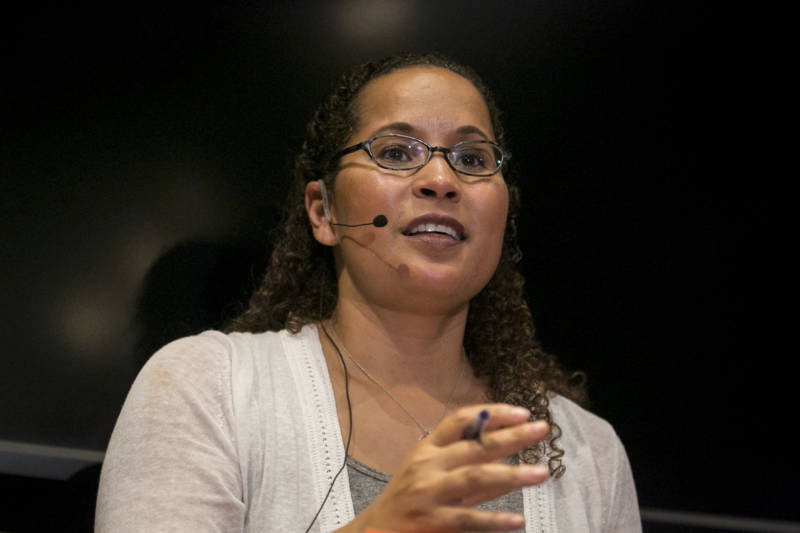Tyson’s decision to meet with authorities came one day after she gave her first public appearance since coming forward with her allegations a week ago. At a talk at Stanford University, “Betrayal and Courage in the Age of #MeToo,” Tyson was greeted with a standing ovation.
“Sometimes you have to lead by example, no matter how hard it is,” said Tyson, a professor of political science at Scripps College in Claremont who is doing a yearlong fellowship at Stanford’s Center for Advanced Study in the Behavioral Sciences.
Organizers of the talk said Tyson’s allegations against Fairfax would not be discussed. But her talk, given together with psychology professor Jennifer Freyd, touched upon questions and issues circulating since she went public.
“Every woman matters. Every survivor matters. Regardless of their background,” Tyson said. “No one is disposable.”
Tyson began her talk by noting that some 65 percent of American women and girls will be raped or become a victim of some type of sexual assault during their lifetimes, citing Centers for Disease Control and Prevention figures.
“This is drastically shaping how we see and interact with the world around us,” she said. “It is a public and health issue. It is killing us.”
Tyson had long been open about being a survivor of childhood incest, friends — including Nadia Brown, an associate professor of political science and African American Studies at Purdue University — told KQED. But in her initial public statement, Tyson said she’d kept quiet about the alleged attack by Fairfax for years.
“After the assault, I suffered from both deep humiliation and shame. I did not speak about it for years, and I (like most survivors) suppressed those memories and emotions as a necessary means to continue my studies, and to pursue my goal of building a successful career as an academic,” she said in a statement issued by her lawyers last week. “At the time, I found this horrific incident especially degrading given my regular volunteer work at a local rape crisis center.”
Her silence began to end when the #MeToo movement erupted in the fall of 2017.
“The passion and resolve of so many survivors, coupled with the job security that tenure afforded me, gave me the strength I simply did not have in 2004,” she said in last week’s statement.
Two longtime friends, professors Dara Strolovitch and Kim Yi Dionne, said Tyson disclosed the alleged assault to them in 2018.
Freyd, who has studied sexual violence for more than 25 years, said Tyson also shared details about the encounter with her and a few other colleagues at Stanford last fall.
“Everything about her story was consistent psychologically and structurally with dozens, if not hundreds, of other accounts I’ve heard,” Freyd said.
Freyd said Fairfax’s initial response to Tyson’s allegations also followed a pattern, citing a term she coined: DARVO, or “deny, attack, and reverse victim and offender.”
“One of the biggest problems with these DARVO responses coming from people in positions of power is it really silences so many other people,” Freyd said. “Because once you see that response, you don’t want to subject yourself to that.”
Tyson’s lawyer said her client will cooperate with all “appropriate investigations,” and was awaiting further word from leadership in the Virginia Legislature about how it will proceed.
Feb. 14: This story has been updated to include additional information about sources who gave interviews.

